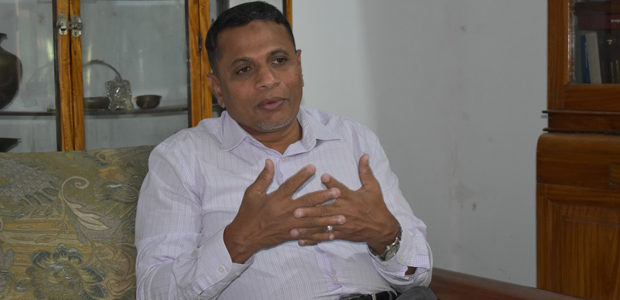The Politics of Individualism
What do minorities gain from identity politics?
In conversation with retired public official, A.L.M. Saleem, Founding President of the Center for Social Change and Development.
A.L.M. Saleem, Senior Administrative Service Officer of the Sri Lanka Administrative Service served as Assistant Commissioner, Assistant Controller, Assistant Secretary, Deputy Director, Government Information Department and Additional Secretary during his tenure. Retired from these roles, he currently acts as Founding President of the Center for Social Change and Development.
“We have to look for another political option when it appears that there is no use in our political leadership. There is no good opinion about our political leaders in the South of Sri Lanka. They look on them with suspicion. Transformation among the people is necessary”, he said.
——————————————
THE CATAMARAN: How important is the administrative service in the public sector?
The Sri Lanka Administrative Service is based on the civil service of the British government. From Presidential Secretary to grassroots Grama Sevaka, the Administrative Service Officers now have very important roles to play in the administration of the Sri Lanka Administrative Service. The administrative field creates decision makers and heads of corporations. People are selected for administrative service through an open competitive examination. These appointments go beyond politics. Selections are made purely on merits and performance, regardless of ethnicity. Good performers go up the ladder. So there is no need to submit public needs to politicians. The main duty of public service is to address the needs of the people.
THE CATAMARAN: But people’s opinion is that state institutions are not acting on people’s needs. Realizing this, President Gotabhaya Rajapakse is making surprise visits to state institutions. What is your opinion?
The president was a ministry secretary. Being an executive, he knows how to effectively serve the public sector. When a country’s president makes sudden visits to a public institution, other institutions may also be on alert. First a state institution has to look at what people need. It has to be ascertained that such services are provided by this institution to the people. Effective service means ensuring that people have the right things at the right time. Today, the standards of services provided by state institutions have somewhat improved based on the principle of productivity. The Passport Office, Department of Registrar of Persons can be sighted as some of such institutions.
THE CATAMARAN: You once served as a Divisional Secretary. To what extent could you serve without external intervention in solving the problems of the people?
By the time I became Divisional Secretary of Sainthamaruthu in 2007, more than 800 families affected by the tsunami were living in a camp and in distress. The government at that time had proposed various programmes. The government provided facilities for the Bolivarian Village for instance. Thus, it was possible to create a village with all amenities such as a school, mosque, multipurpose building, playground, offices etc. for the area. Nearly one billion Rupees was spent through state and non-governmental organizations for this purpose and today, it is a beautiful village.
THE CATAMARAN: What is an ideal relationship between public officials and politicians?
It is mandatory that people’s representatives be invited for development-related meetings. There are people representing every area in the district. Although there is political leadership to represent the area, they are less likely to attend meetings. As officers we cannot question this, but a politician can. There is no consultation on development. Simply making speeches will not solve problems. In fact, there is a huge gap between politicians and officials. In some cases the politician comes to the level of enslaving a Divisional Secretary. Forcing him to do what he says. Interfering with the administration for one’s own selfish interest has to stop. It has a negative impact on society. Politicians and officers must work together for the common good.
THE CATAMARAN: What is your opinion on today’s political trend?
Today, minority communities are dragged to one side due to self-interest. This has caused communal divisions among people. Racism has emerged in the form of minority and majority. During the last presidential election, a communal division was created. If we are to safeguard our existence as minorities, we have to go along with the majority community. An immense rift will emerge between communities when a minority despises a leader whom a majority wants in power. Racism has become the result of everyone trying to take advantage of that rift. We have to work in collaboration with the majority community for amelioration.
THE CATAMARAN: How have our minorities practicing in politics for several decades shaped identity politics?
We need to move away from identity politics. We must ask ourselves what we gained from it in the last 20 years. Prior to 2000, our community had many benefits. The change since then has created social gaps. Such separate identity politics in our nation has created a separation of the population as a majority Sinhalese and as minority Tamils and Muslims. Even in the coming parliamentary elections, it will only reinforce those racial divisions as it travels in such separate identity politics. We need to get out of it. Even the last presidential election has taught us a lesson. When bargaining power is neglected, we must look for alternative ways. People of the south do not have a good opinion about our political leaders. They look at them with suspicion. There must be some kind of transformation among the people.
THE CATAMARAN: How should political leaders be formed?
Actually, social change needs to work beyond racial and ethnic differences. Those who know the administration should get into politics. The future youth community must be nurtured with leadership qualities. They should be provided with training for the development of the country, which can travel in the national political stream. Regardless of qualifications that are required for public sector management, people should elect individuals with the same qualities as their representatives. We also plan to carry out such tasks through our organization.










